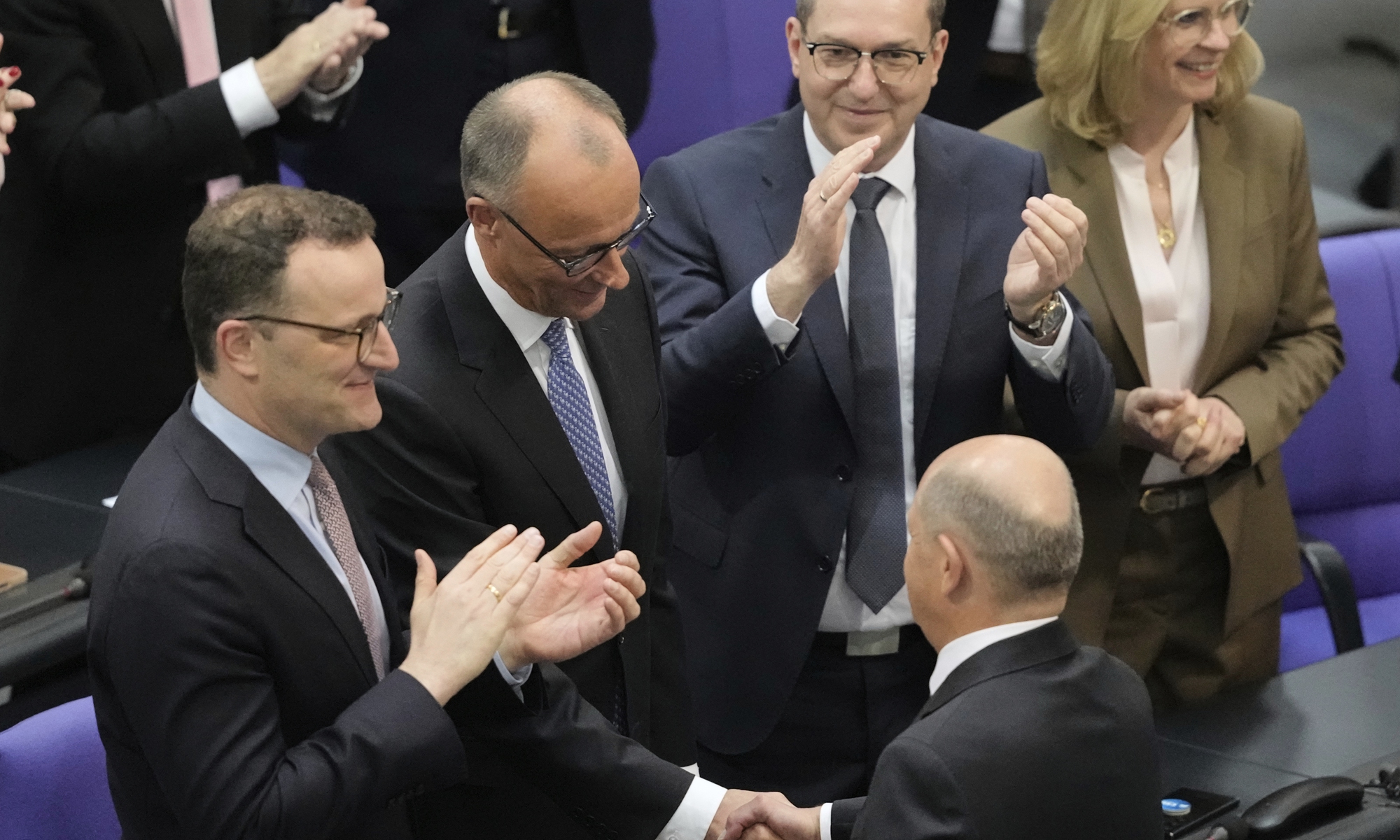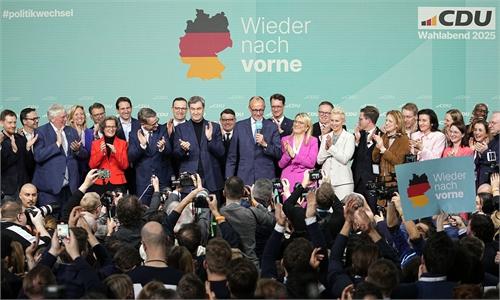Merz wins Germany's chancellorship on second ballot,‘likely to prioritize boosting economy, creating jobs, addressing fiscal deficit’

Friedrich Merz from the Christian Democratic Union (second from left), is congratulated by Olaf Scholz, after being elected new chancellor at the German federal parliament, Bundestag, at the Reichstag building in Berlin, Germany, on May 6, 2025. Photo: VCG
Friedrich Merz succeeded Tuesday in his bid to become the next German chancellor during a second vote in parliament, hours after he suffered a historic defeat in the first round, according to the Associated Press.
Merz lost the first round of votes Tuesday morning in a historic defeat, but ultimately prevailed hours later on the second ballot, AP reported.
Merz was set to immediately begin the ceremonial tasks of assuming the country's top leadership post, which were delayed half a day by the events in Parliament, before embarking on Wednesday for Paris and Warsaw to meet with key allies, the New York Times reported.
The 69-year old Merz is part of the center-right Christian Democratic Union (CDU) which, alongside its sister party the Christian Social Union (CSU), secured the largest shares of votes in February's election. The center-left Social Democratic Party (SPD) is also part of the new ruling coalition, having placed third in the election, according to CNBC.
The two parties aim to revive growth in Germany just as a global trade war sparked by the US' sweeping import tariffs threatens another recession year, as well as to ramp up defense spending amid strains in the transatlantic NATO alliance, Reuter reported.
"Tomorrow you will get ... a government that is determined to move Germany forward with reforms and investment," Merz said Monday ahead of a coalition agreement being signed according to a CNBC translation.
Merz will likely to continue the CDU/CSU's governing concept to pursue autonomy in the diplomacy, Zhao Junjie, a senior research fellow at the Chinese Academy of Social Sciences' Institute of European Studies, told the Global Times on Tuesday.
Given the current economic and social challenges Germany is facing, Merz is likely to prioritize boosting the economy, creating jobs, and addressing the fiscal deficit, where he is expected to make significant progress, Zhao said.
The French newspaper Le Monde said that "it is an understatement to say that Friedrich Merz's arrival at the head of the German federal chancellery is eagerly awaited by his partners in Europe."
The new leadership team in Berlin is taking office at a time when the European Union faces the greatest strategic and geopolitical uncertainties since the end of the Cold War, 35 years ago, the report said.
Zhao also said that Germany aims to strengthen its defense capabilities to secure a strong position in Europe's future security framework.
Speaking of China-Germany relations, the expert noted that the relationship between the two countries has been a stabilizing anchor for China-Europe relations and remains generally positive.
As a result, the green economy and digital economy could serve as potential areas for cooperation between the two countries, Zhao added.
On February 24, when asked to comment on preliminary results that the Christian Democratic Union has won the federal election in Germany, Chinese Foreign Ministry spokesperson Lin Jian stated that over the past 53 years of diplomatic ties, China has viewed its relations with Germany from a strategic and long-term perspective, and developed the bilateral relations under the principles of mutual respect, equality, mutual benefit and seeking common ground while shelving differences. China stands ready to work with the new German federal government to consolidate and grow the China-Germany comprehensive strategic partnership.
Germany and the EU are of global significance. China is glad to see Germany and the EU play an important role in global affairs, supports the integration of Europe and the strategic independence of the EU, and is ready to work with Germany and the EU to continue contributing to world peace and prosperity, said Lin.
Previously, Chinese Foreign Minister Wang Yi met with Merz on the sidelines of the Munich Security Conference on February, where Merz said Germany firmly supports free trade, and deeper cooperation between Germany, as well as Europe, and China, according to the Xinhua News Agency.



